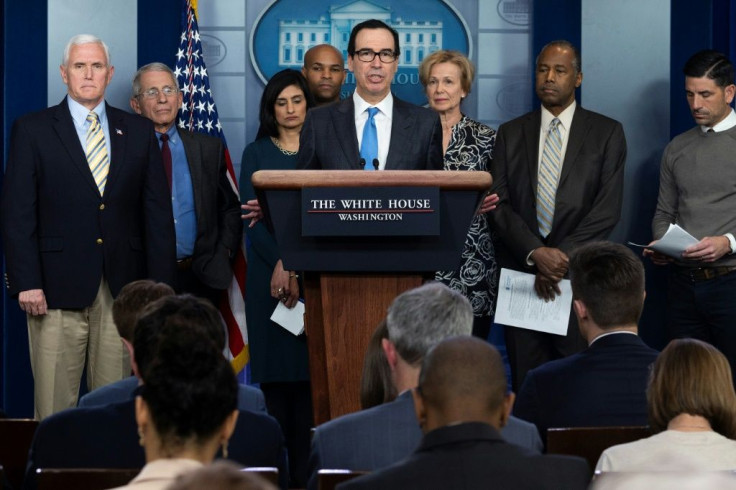Trump To Put Money In Hands Of Americans 'Immediately' To Stem Coronavirus Damage

KEY POINTS
- Mnuchin is presenting an $850 billion stimulus package to Senate Republicans
- The administration wants to mail out checks to individuals within two weeks
- The Medicare telemedicine program is being expanded at no charge to patients
Treasury Secretary Steven Mnuchin said Tuesday the economic stimulus package he plans to present to Senate Republicans will include putting cash into the hands of Americans “immediately.”
Sen. Mitt Romney, R-Utah, has suggested giving $1,000 to each American adult. Mnuchin indicated the number could be higher than that but there might be some sort of means testing.
“Obviously someone who makes $1 million doesn’t need a check,” Mnuchin said at the daily coronavirus briefing.
Mnuchin also said there are no plans to shut down the stock exchanges.
Mnuchin is expected to present an $850 billion economic stimulus package to lawmakers. President Trump said he decided to “go big” in his request so the administration doesn’t have to keep going back for more money. The proposal comes as the Senate considered a $100 billion package adopted by the House last week that included free testing for COVID-19, paid sick leave, and enhanced unemployment benefits and food stamps.
“We are going to save the maximum number of lives,” Trump said.
The action came as the number of U.S. infections approached 5,000 with more than six dozen deaths.
“We’re giving relief to affected industries and small businesses, and we’re ensuring that we emerge from this challenge with a prosperous and growing economy, because that’s what’s going to happen,” Trump said.
“It’s [the economic stimulus package] going to be big, it’s going to be bold, and the level of enthusiasm to get something done I don’t think I’ve seen anything quite like it.”
Mnuchin left the news conference to present the proposals to Senate Republicans over lunch. He said the administration hoped to send out checks within the next two weeks since simply suspending payroll taxes would not get money to people quickly enough.
“We’re looking at sending checks to Americans immediately,” Treasury Secretary Steve Mnuchin said. “And I mean, now in the next two weeks. … Americans need cash now,” he said without stipulating how large the checks would be but said they might be larger than what is being “reported in the press.”
Trump said he and his advisers considered a payroll tax holiday but decided that was inadequate.
“Payroll tax is one way, but it does come over a period of months, many months,” Trump said. "And we want to do something much faster than that. So, I think we have ways of getting money out pretty quickly and very accurately.”
Mnuchin said the package would include relief for airlines, as well as defer income tax payments for both individuals and businesses beyond the April 15 deadline without penalties or interest. He said Trump had authorized up to $300 billion in deferrals – up to $1 million for individuals and small businesses and $10 million for corporations.
Vice President Mike Pence said plans are underway for setting up field hospitals should current facilities be overwhelmed.
Seema Verma, who heads the Center for Medicaid and Medicare Services, said the Medicare telemedicine program will be expanded without charge to patients.
Trump met with fast-food company CEOs before the briefing to encourage them to keep their drive-through operations going, adding that he expects them to begin feeding an even greater proportion of Americans.
Dr. Deborah Birx, who is coordinating the administration response, said experts are evaluating models that predict as many as 2.2 million Americans could die from the virus. She said that’s likely a worst-case scenario if Americans don’t follow the Centers for Disease Control and Prevention guidelines for stemming the spread of the disease.
Trump recommended that people “just enjoy their living room” for the next two weeks.
“We have to win this war, quickly, quickly, and I’m not even talking about the economy,” Trump said.
“We’re going to do whatever it takes,” Vice President Mike Pence said.
Dr. Anthony Fauci, head of the National Institute of Allergies and Infectious Disease, said it’s impossible to predict how long the outbreak will last but the mitigation actions that are being put into place will keep infections from spiking.
© Copyright IBTimes 2024. All rights reserved.






















